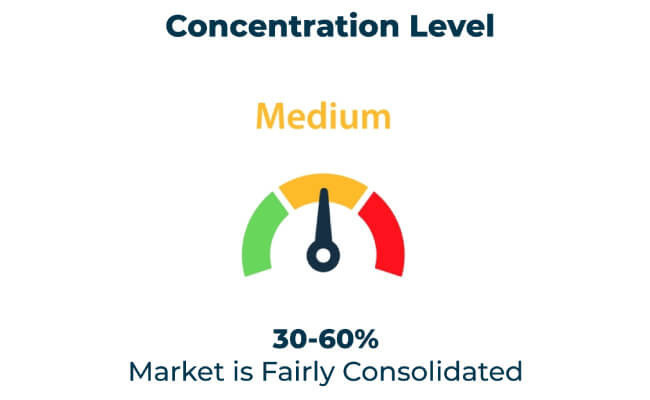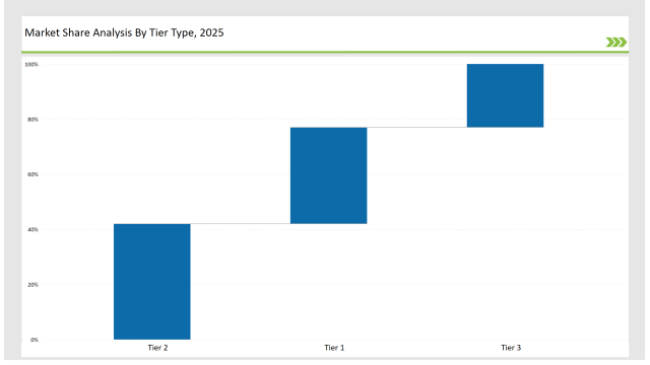The resealable packaging bag market is expanding with consumers and manufacturers choosing convenience and sustainability and longer product freshness. The resealable bag market has expanded in food, pharmaceuticals, and personal care, where airtight sealing, tamper-evidence, and reusability offer functional advantages to the packaging. Companies are looking at advanced materials, sustainability, and smart closures, thereby value-adding to their current portfolios.
To counter plastic pollution, companies are investing in recyclable films, biodegradable zippers, and compostable resealable packaging. The industry is therefore moving towards high barrier materials, flexible packaging formats, and smart resealing technology to deliver maximum performance, longevity, and consumer-friendly solutions.
Amcor, Berry Global, and Sealed Air, representative Tier 1 players, dominate 35% of the market through their advanced technologies in flexible packaging, sustainability efforts, and global distribution capabilities.
Tier 2 players Mondi Group, Coveris, and ProAmpac have captured 42% of the market by offering affordable high barrier recyclable resealable packaging solutions across different industries.
Tier 3 comprises niche and regional players dealing in compostable resealable bags, bio-based films, and bespoke packaging and accounts for 23% of the market. These players are more locally focused in their approach to production as far as sustainable materials are concerned. These players keenly concentrate on consumer-driven packaging designs.
Global Market Share by Key Players (2025)
| Category | Market Share (%) |
|---|---|
| Top 3 (Amcor, Berry Global, Sealed Air) | 18% |
| Rest of Top 5 (Mondi Group, Coveris) | 9% |
| Next 5 of Top 10 (ProAmpac, Sonoco, Printpack, Glenroy, Winpak) | 8% |

The resealable packaging bag industry serves multiple sectors where freshness, sustainability, and convenience are essential. Companies are developing innovative resealable solutions to enhance product longevity and reduce waste.
Manufacturers are optimizing resealable packaging with innovative closures, high-performance materials, and sustainable alternatives.
Reusability and sustainability are obviously driving the resealable packaging bag industry. Businesses embrace AI-driven production techniques, plant-based resins, and digital tracking capabilities to render packaging far more usable. At the same time, increasingly companies are now producing ultra-thin, ultra-sturdy materials for enhanced recyclability without loss of strength. Manufacturers then add the most recent breakthroughs in smart resealing technology, such as self-adhesive and magnetic closure systems, for easier consumer use. Conversely, additional optimization of progressive flexible packaging was also undertaken, with advanced moisture-resistant layers, for increased shelf life.
Technology suppliers should focus on automation, sustainable material development, and digital tracking integration to support the growing resealable packaging market. Partnering with food, pharmaceutical, and personal care brands will accelerate innovation.
| Tier Type | Example of Key Players |
|---|---|
| Tier 1 | Amcor, Berry Global, Sealed Air |
| Tier 2 | Mondi Group, Coveris, ProAmpac |
| Tier 3 | Sonoco, Printpack, Glenroy, Winpak |

Leading manufacturers are advancing resealable packaging technology with AI-driven automation, sustainable materials, and tamper-proof sealing innovations.
| Manufacturer | Latest Developments |
|---|---|
| Amcor | Launched recyclable resealable pouches in March 2024. |
| Berry Global | Developed biodegradable zipper bags in April 2024. |
| Sealed Air | Expanded vacuum-sealable packaging in May 2024. |
| Mondi Group | Released paper-based resealable bags in June 2024. |
| Coveris | Strengthened reusable personal care packaging in July 2024. |
| ProAmpac | Introduced compostable, plant-based resealable pouches in August 2024. |
| Sonoco | Pioneered child-resistant resealable pharmaceutical packaging in September 2024. |
The resealable packaging market is evolving as companies invest in sustainable materials, smart resealing technologies, and consumer-driven innovations.
The market will keep combining AI-powered manufacturing, eco-friendly materials, and new resealing technologies. Manufacturers will advance bio-based films to enhance compostability. Companies will embrace smart resealing technology to make products more convenient and longer-lasting. Companies will create high-barrier solutions to enhance moisture protection and food freshness. Digital authentication will improve security and lower the risk of counterfeiting. Firms will also optimize lightweight resealable packaging to reduce environmental footprint.
Leading players include Amcor, Berry Global, Sealed Air, Mondi Group, Coveris, ProAmpac, and Sonoco.
The top 3 players collectively control 18% of the global market.
The market shows medium concentration, with top players holding 35%.
Key drivers include sustainability, convenience, smart resealing, and regulatory compliance.






Our Research Products

The "Full Research Suite" delivers actionable market intel, deep dives on markets or technologies, so clients act faster, cut risk, and unlock growth.

The Leaderboard benchmarks and ranks top vendors, classifying them as Established Leaders, Leading Challengers, or Disruptors & Challengers.

Locates where complements amplify value and substitutes erode it, forecasting net impact by horizon

We deliver granular, decision-grade intel: market sizing, 5-year forecasts, pricing, adoption, usage, revenue, and operational KPIs—plus competitor tracking, regulation, and value chains—across 60 countries broadly.

Spot the shifts before they hit your P&L. We track inflection points, adoption curves, pricing moves, and ecosystem plays to show where demand is heading, why it is changing, and what to do next across high-growth markets and disruptive tech

Real-time reads of user behavior. We track shifting priorities, perceptions of today’s and next-gen services, and provider experience, then pace how fast tech moves from trial to adoption, blending buyer, consumer, and channel inputs with social signals (#WhySwitch, #UX).

Partner with our analyst team to build a custom report designed around your business priorities. From analysing market trends to assessing competitors or crafting bespoke datasets, we tailor insights to your needs.
Supplier Intelligence
Discovery & Profiling
Capacity & Footprint
Performance & Risk
Compliance & Governance
Commercial Readiness
Who Supplies Whom
Scorecards & Shortlists
Playbooks & Docs
Category Intelligence
Definition & Scope
Demand & Use Cases
Cost Drivers
Market Structure
Supply Chain Map
Trade & Policy
Operating Norms
Deliverables
Buyer Intelligence
Account Basics
Spend & Scope
Procurement Model
Vendor Requirements
Terms & Policies
Entry Strategy
Pain Points & Triggers
Outputs
Pricing Analysis
Benchmarks
Trends
Should-Cost
Indexation
Landed Cost
Commercial Terms
Deliverables
Brand Analysis
Positioning & Value Prop
Share & Presence
Customer Evidence
Go-to-Market
Digital & Reputation
Compliance & Trust
KPIs & Gaps
Outputs
Full Research Suite comprises of:
Market outlook & trends analysis
Interviews & case studies
Strategic recommendations
Vendor profiles & capabilities analysis
5-year forecasts
8 regions and 60+ country-level data splits
Market segment data splits
12 months of continuous data updates
DELIVERED AS:
PDF EXCEL ONLINE
Resealable Packaging Bag Market Analysis by PE and PP Through 2034
Understanding Market Share Trends in Bagasse Packaging
Key Players & Market Share in Conical Bags Packaging Market
Market Share Breakdown of Liquid Packaging Bag Manufacturers
Market Share Distribution Among Resealable Closures and Spouts Packaging Providers
Bag-in-box Packaging Market Size and Share Forecast Outlook 2025 to 2035
Resealable Packaging Labels Market Size and Share Forecast Outlook 2025 to 2035
Market Share Breakdown of the IV Bag Market
Market Share Breakdown of Bag-In-Box Manufacturers
Competitive Landscape of Bag-in-Tube Market Share
Bag Feed Seal Pouch Packaging Machine Market Size and Share Forecast Outlook 2025 to 2035
Conical Bags Packaging Market Size and Share Forecast Outlook 2025 to 2035
Competitive Overview of Wine Bag Companies
Assessing Tote Bag Market Share & Industry Trends
Understanding Market Share Trends in Mesh Bags
Competitive Landscape of Oven Bag Providers
Market Share Insights for Bagasse Bowls Providers
Competitive Breakdown of Silo Bag Manufacturers
Market Share Distribution Among Garbage Bag Companies
Global Packaging Tapes Market Share Analysis – Size, Growth & Forecast 2025–2035

Thank you!
You will receive an email from our Business Development Manager. Please be sure to check your SPAM/JUNK folder too.
Chat With
MaRIA